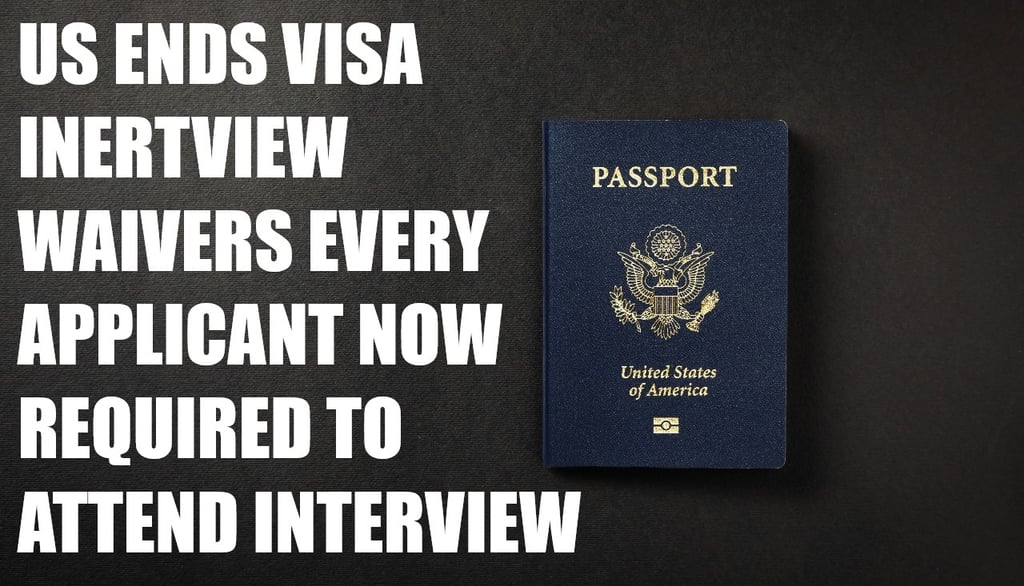US Ends Visa Interview Waivers | New Visa Policy September 2, 2025
The US has ended visa interview waivers effective September 2, 2025. Every applicant must now attend an in-person interview, impacting millions worldwide.
Raja Awais Ali
9/2/20252 min read


US Ends Visa Interview Waivers, Every Applicant Now Required to Attend Interview
The United States has officially ended its visa interview waiver program, effective September 2, 2025. This new policy means that every applicant, whether applying for a new visa or renewing an existing one, must now attend an in-person interview at a U.S. embassy or consulate. The decision was announced by the U.S. State Department amid growing concerns over national security and the rising number of global visa applications.
Previously, certain categories of applicants were exempted from the interview process. Children under the age of 14, senior citizens above 79, and those renewing visas in the same category often obtained approval without a personal interview. However, under the new rules, these exemptions have been eliminated. Every applicant will now be subject to biometric verification and face-to-face security checks. U.S. officials have justified the move, saying it will strengthen border security and make the overall visa process more transparent.
The change is expected to have a direct impact on applicants from South Asia, including Pakistan, India, Bangladesh, and other countries, which together send hundreds of thousands of students, businesspeople, and tourists to the United States each year. In many of these countries, securing a visa appointment is already a lengthy process, often taking several months. With mandatory interviews for all applicants, wait times are expected to increase further, creating additional challenges for those with urgent travel or academic deadlines.
Students are likely to face the greatest difficulties. Many rely on timely visa approvals to begin or continue their studies in U.S. universities. Delays in interview appointments could disrupt academic schedules, scholarships, and research opportunities. Business communities have also raised concerns, arguing that the policy will increase costs, prolong travel plans, and create unnecessary hurdles for entrepreneurs seeking to attend conferences or establish trade ties in the United States.
At the same time, U.S. authorities maintain that the policy is critical in addressing modern security challenges. With increased global travel, migration, and digital identity fraud, officials argue that face-to-face interviews allow consular officers to better evaluate applicants and reduce risks. By eliminating interview waivers, the State Department believes it can prevent potential loopholes in the visa system and ensure thorough background checks for everyone entering the country.
International reactions to the decision have been mixed. Supporters view the move as a necessary step to strengthen U.S. security and immigration controls. Critics, however, warn that it could strain America’s diplomatic, educational, and cultural ties, especially at a time when global collaboration is more important than ever. Universities in the United States, which depend heavily on international students, fear enrollment could drop if visa delays worsen. Similarly, tourism and hospitality sectors may feel the impact if travelers reconsider visiting the U.S. due to longer wait times.
The end of the interview waiver program marks a significant shift in U.S. immigration policy. While the government highlights security as its top priority, millions of applicants around the world now face longer, costlier, and more complicated processes. In the coming months, it will become clearer whether Washington takes additional steps to streamline the system or whether this decision leads to more frustration among global travelers.